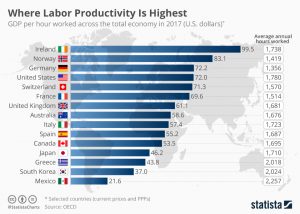According to the OECD, Mexico, South Korea and Greece are among the countries with the longest working hours every year. In Mexico, average annual hours worked come to 2,257 while in South Korea and Greece, they total 2,024 and 2,018 every year respectively. Despite that, a longer working week does not necessarily result in higher levels of productivity. In 2017, GDP per hour worked across the economy came to $21.6 in Mexico, $37 in South Korea and $38.9 in Greece.
By contrast, GDP per hour worked is $99.5 in Ireland, $83.1 in Norway and $72.2 in Germany. That’s despite all three of those countries working less hours per year on average than the ones mentioned above. That certainly reinforces the idea that a four-day working week could boost productivity and match current economic output. That was trialled by a company in New Zealand in July and concluded that a four-day working week resulted in a drastic improvement in work-life balance, productivity, heightened commitment, and lower stress levels.
source: statista

Ask me anything
Explore related questions





